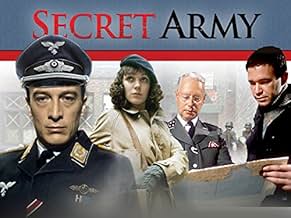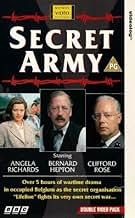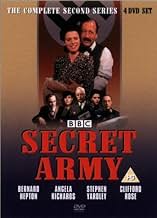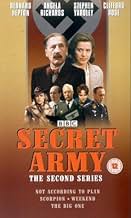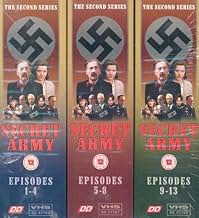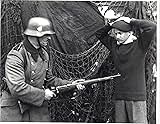Secret Army
- TV Series
- 1977–1979
- 50m
IMDb RATING
8.5/10
1.8K
YOUR RATING
During World War II, a Belgian resistance movement called Lifeline, based in Brussels, organises the return of Allied airmen who have been shot down by the Luftwaffe to the United Kingdom.During World War II, a Belgian resistance movement called Lifeline, based in Brussels, organises the return of Allied airmen who have been shot down by the Luftwaffe to the United Kingdom.During World War II, a Belgian resistance movement called Lifeline, based in Brussels, organises the return of Allied airmen who have been shot down by the Luftwaffe to the United Kingdom.
- Won 1 BAFTA Award
- 2 wins & 1 nomination total
Browse episodes
Featured reviews
The 1970s was undoubtedly the golden age of British television . There were so many great shows , everything from the Jon Pertwee and early Tom Baker episodes of DOCTOR WHO , THE SWEENEY , THE PROFFESIONALS , FALWTY TOWERS and a dozen other shows that I could list off the top of my head . Perhaps that's why I'd forgotten all about SECRET ARMY a show that I've just been watching again on one of the history channels on freeview and I'm instantly reminded as to how great it was and left me me wondering slightly as to how I'd forgotten it . Actually I think I know why it's unfairly forgotten but I'll explain in a moment
What's so striking is how much thought has gone in to the series . Producer and series creator Gerald Glaister spent the second world war as a bomber pilot and this brings a personal dimension to a series like this . Imagine for a second how much inferior this drama would have been if it'd been produced today by someone from an academic media studies background . It'd almost be a parody wouldn't it ? Take notice too that each and every episode was inspired by actual events that took place during the war and how much research went in to every script . It's sad that today we rarely see if ever such thought go in to a drama
SECRET ARMY is drama ith a capital D . Even if you've little interest in the second world war you can't fail to notice the rich characterisation and intelligent writing . This greatly helps the cast and draws the audience in to on screen events as the Belgian " Lifeline " resistance try to help downed allied bomber crews escape to a neutral country where they'll eventually be repatriated to Britain . It's interesting to note that there's so much moral ambiguity involved . Series hero Albert for instance isn't only painted as a Belgian freedom loving patriot , he's also someone who accepts sums of money from the Brirtish government which helps him run an exclusive restaurant and he hates communists , not as much as his right hand man and confessed thief Max Brocard , but still someone who's not got a selfless motive for helping the allies . There's also doubt in his mind after a main character is written out of the first series in a cruelly ironic way but the money sure comes handy . Likewise the series " Good German " Major Erwin Brandt almost beats an RAF airman to death , a bomb aimer who is only saved by the intervention of gestapo chief Ludwig Kessler
Ludwig Kessler deserves his own paragraph because he is quite simply one of the greatest characters created for British television . Again imagine if he was a character created today he'd be portrayed as one of those " Ve have vays of making you talk Englander " goose stepping stereotypes . He is a three dimensional character who is obviously capable of great cruelty but who is also very intelligent and is driven by a desire to bring order to the world . He is someone who never fails to point out to the other characters " That every hour of the day and night German women and children are being murdered in large numbers by American and British terror raids " . You're not going to like him but you can understand what's motivating him . Praise too for the acting of Clifford Rose who gives a restrained and very subtle performance . Look closely and you'll notice one of Kessler's personal flaws is that he seems very lonely . You could almost feel sorry for him if he wasn't a gestapo head
So why is this show forgotten ? One reason only and that's 'ALLO 'ALLO is directly based upon it . A comedy show that ran for ten years based upon a spoof premise and endless repetitive lines like " Good moaning ... " you stupid woman " and " the madonna with the flashing boobies " YAWN . You quickly become so bored with that comedy show that you quickly forget what inspired it . Perhaps when I say you'll forget all about Renee and the camp Nazis when you watch the repeats of SECRET ARMY you will realise what a genuinely great drama it is
What's so striking is how much thought has gone in to the series . Producer and series creator Gerald Glaister spent the second world war as a bomber pilot and this brings a personal dimension to a series like this . Imagine for a second how much inferior this drama would have been if it'd been produced today by someone from an academic media studies background . It'd almost be a parody wouldn't it ? Take notice too that each and every episode was inspired by actual events that took place during the war and how much research went in to every script . It's sad that today we rarely see if ever such thought go in to a drama
SECRET ARMY is drama ith a capital D . Even if you've little interest in the second world war you can't fail to notice the rich characterisation and intelligent writing . This greatly helps the cast and draws the audience in to on screen events as the Belgian " Lifeline " resistance try to help downed allied bomber crews escape to a neutral country where they'll eventually be repatriated to Britain . It's interesting to note that there's so much moral ambiguity involved . Series hero Albert for instance isn't only painted as a Belgian freedom loving patriot , he's also someone who accepts sums of money from the Brirtish government which helps him run an exclusive restaurant and he hates communists , not as much as his right hand man and confessed thief Max Brocard , but still someone who's not got a selfless motive for helping the allies . There's also doubt in his mind after a main character is written out of the first series in a cruelly ironic way but the money sure comes handy . Likewise the series " Good German " Major Erwin Brandt almost beats an RAF airman to death , a bomb aimer who is only saved by the intervention of gestapo chief Ludwig Kessler
Ludwig Kessler deserves his own paragraph because he is quite simply one of the greatest characters created for British television . Again imagine if he was a character created today he'd be portrayed as one of those " Ve have vays of making you talk Englander " goose stepping stereotypes . He is a three dimensional character who is obviously capable of great cruelty but who is also very intelligent and is driven by a desire to bring order to the world . He is someone who never fails to point out to the other characters " That every hour of the day and night German women and children are being murdered in large numbers by American and British terror raids " . You're not going to like him but you can understand what's motivating him . Praise too for the acting of Clifford Rose who gives a restrained and very subtle performance . Look closely and you'll notice one of Kessler's personal flaws is that he seems very lonely . You could almost feel sorry for him if he wasn't a gestapo head
So why is this show forgotten ? One reason only and that's 'ALLO 'ALLO is directly based upon it . A comedy show that ran for ten years based upon a spoof premise and endless repetitive lines like " Good moaning ... " you stupid woman " and " the madonna with the flashing boobies " YAWN . You quickly become so bored with that comedy show that you quickly forget what inspired it . Perhaps when I say you'll forget all about Renee and the camp Nazis when you watch the repeats of SECRET ARMY you will realise what a genuinely great drama it is
This programme is a true masterpiece; possibly the best television series ever made by the BBC.
When I watched it as a young teenager, it was totally memorable and gripping. It is probably the only TV series of its kind from which I could recall every character and many of the plots some 25 or 30 years later. Some of the episodes toward the end of the final series were utterly gripping. The acting was outstanding; the writing fantastic, and the music and intro/credits I recall to this day with total clarity.
UDATE: Having just watched it again on DVD almost 30 years later, my view hasn't changed at all. No sense of disappointment here - this really is classic television at its very best. A clever, nuanced and absorbing series in every respect.
When I watched it as a young teenager, it was totally memorable and gripping. It is probably the only TV series of its kind from which I could recall every character and many of the plots some 25 or 30 years later. Some of the episodes toward the end of the final series were utterly gripping. The acting was outstanding; the writing fantastic, and the music and intro/credits I recall to this day with total clarity.
UDATE: Having just watched it again on DVD almost 30 years later, my view hasn't changed at all. No sense of disappointment here - this really is classic television at its very best. A clever, nuanced and absorbing series in every respect.
I've just finished watching Secret Army on UK Drama and, for me, it's BBC drama at its best. It might have seemed hard for the team that had produced the highly acclaimed 'Colditz' series to live up to its reputation but I believe that this highly popular classic surpassed it.
Colditz did have a distinct disadvantage, taking place mostly within the four walls of a POW camp, making the atmosphere at times rather claustrophobic and making the scope rather limited. Secret Army, on the other hand, was able to use and contrast a variety of places and situations. As well as this, it had more detailed analysis of the all the characters - something which was often lacking in its forerunner and also examined their motives. Using the setting of Brussels in World War II, the producers were able to capture perfectly the grim realities of life under German occupation with the distant hope of liberation. Everything from the sinister music to the camera angles, special effects and scenery was cleverly thought out. The varied plots, whose frequent twists kept everyone guessing, along with many clever subtleties and inferences, made each episode thoroughly enjoyable.
The central character of Albert Foiret was carefully scrutinised, his greed and ruthless determination to keep ownership of his beloved Candide at any cost coming out. Bernard Hepton seemed able to show an inexhaustible range of emotions, making his character something of a change from the German Kommandant he had played previously. In contrast, the virtually emotionless Kessler could show generosity, and great loyalty, albeit misguided, to his beloved country and Fuehrer. Clifford Rose was perfect as the bespectacled, ice-cold SS man with no sense of humour. Even the smaller parts, such as Alain and Dr. Keldermans were well played by Ron Pember and Valentine Dyall, along with Monique (Angela Richards) whose lovely singing in the seemingly happy atmosphere of the Candide was often made to contrast the often sinister goings on elsewhere.
The series just seemed to go from strength to strength as the characters developed and plots became more complicated. The last few episodes produced a gripping climax as we were left wondering how all the ongoing issues were going to resolve themselves, and there was much irony when many did not end up the way you would have expected.
Unlike many of the older WW2 films this serial was certainly not biased towards the allies - airmen were often seen to act rather crassly and the resistance people could be less than scrupulous, sometimes killing innocent people and breaking promises for their own survival. It also addressed many issues which were not always fully appreciated, like the uneasy relationship the French and Belgian police had with the Germans, the contempt felt by the Wehrmacht for the SS and the bitter power struggle between the resistance and the communists. Being a product of the 70s there was none of the gratuitous violence or obligatory sex scenes which can sometimes mar the storylines of more contemporary works.
Secret Army was very much a true-to-life drama - even if there were many improbable coincidences and few factual errors with many memorable episodes. I'd certainly recommend it.
Colditz did have a distinct disadvantage, taking place mostly within the four walls of a POW camp, making the atmosphere at times rather claustrophobic and making the scope rather limited. Secret Army, on the other hand, was able to use and contrast a variety of places and situations. As well as this, it had more detailed analysis of the all the characters - something which was often lacking in its forerunner and also examined their motives. Using the setting of Brussels in World War II, the producers were able to capture perfectly the grim realities of life under German occupation with the distant hope of liberation. Everything from the sinister music to the camera angles, special effects and scenery was cleverly thought out. The varied plots, whose frequent twists kept everyone guessing, along with many clever subtleties and inferences, made each episode thoroughly enjoyable.
The central character of Albert Foiret was carefully scrutinised, his greed and ruthless determination to keep ownership of his beloved Candide at any cost coming out. Bernard Hepton seemed able to show an inexhaustible range of emotions, making his character something of a change from the German Kommandant he had played previously. In contrast, the virtually emotionless Kessler could show generosity, and great loyalty, albeit misguided, to his beloved country and Fuehrer. Clifford Rose was perfect as the bespectacled, ice-cold SS man with no sense of humour. Even the smaller parts, such as Alain and Dr. Keldermans were well played by Ron Pember and Valentine Dyall, along with Monique (Angela Richards) whose lovely singing in the seemingly happy atmosphere of the Candide was often made to contrast the often sinister goings on elsewhere.
The series just seemed to go from strength to strength as the characters developed and plots became more complicated. The last few episodes produced a gripping climax as we were left wondering how all the ongoing issues were going to resolve themselves, and there was much irony when many did not end up the way you would have expected.
Unlike many of the older WW2 films this serial was certainly not biased towards the allies - airmen were often seen to act rather crassly and the resistance people could be less than scrupulous, sometimes killing innocent people and breaking promises for their own survival. It also addressed many issues which were not always fully appreciated, like the uneasy relationship the French and Belgian police had with the Germans, the contempt felt by the Wehrmacht for the SS and the bitter power struggle between the resistance and the communists. Being a product of the 70s there was none of the gratuitous violence or obligatory sex scenes which can sometimes mar the storylines of more contemporary works.
Secret Army was very much a true-to-life drama - even if there were many improbable coincidences and few factual errors with many memorable episodes. I'd certainly recommend it.
I wasn't even born when this series was first made. It was my mother who introduced me to the series on uk drama. She insisted that I 'give it a chance.'I am glad that I did!
During the first series the show showed little potential, the characters were stereotypical and shallow, such as Kessler, with his robotic like ways and constant determination to get one over on life line. The melodramatic content was so bad you could almost hear him shouting: 'I'll get you next time!' at the end of every episode. However somebody waved their magic wand at the start of the second series, because the show changed it's angle completely. With the dramatic exit of Yvette, (one of my favourite scenes in television)and the introduction of the Candide. We saw alot of changes for the characters. Kessler gained a love interest, and at last we could see his human side.Life line too showed it had some weak human traits, more often then not Albert's greed resulted in him ordering command just so that he could keep his precious restaurant. And when Monique was left in charge at the end of series two she turned into a bit of a boozer! More importantly, as the storylines developed and conspiracies got more complicated, life line didn't always end up on top, usually at the expense of poor Natalie or Monique.
The show came to prove that it was more about humans fight for survival. And less about the adventurous action man enthusiasm sometimes given to war in american films. What a shame that somebody made a spoof in the form of 'allo, 'allo. This became more famous than the original classic and now shadows it's brilliance. As my Mother insisted to me, I would insist to you: 'give it a chance, please!'
During the first series the show showed little potential, the characters were stereotypical and shallow, such as Kessler, with his robotic like ways and constant determination to get one over on life line. The melodramatic content was so bad you could almost hear him shouting: 'I'll get you next time!' at the end of every episode. However somebody waved their magic wand at the start of the second series, because the show changed it's angle completely. With the dramatic exit of Yvette, (one of my favourite scenes in television)and the introduction of the Candide. We saw alot of changes for the characters. Kessler gained a love interest, and at last we could see his human side.Life line too showed it had some weak human traits, more often then not Albert's greed resulted in him ordering command just so that he could keep his precious restaurant. And when Monique was left in charge at the end of series two she turned into a bit of a boozer! More importantly, as the storylines developed and conspiracies got more complicated, life line didn't always end up on top, usually at the expense of poor Natalie or Monique.
The show came to prove that it was more about humans fight for survival. And less about the adventurous action man enthusiasm sometimes given to war in american films. What a shame that somebody made a spoof in the form of 'allo, 'allo. This became more famous than the original classic and now shadows it's brilliance. As my Mother insisted to me, I would insist to you: 'give it a chance, please!'
I have recently seen this series about WW2 escape lines again. It hardly dates at all. The stories are hard hitting,realistic as are the characters. I hope all these will become available on DVD soon.
Did you know
- TriviaEach of the scripts were based on real events and thoroughly researched. On several occasions throughout the series's run, the BBC would reject a script as it was deemed too accurate and potentially upsetting to audiences or too politically sensitive.
- ConnectionsFeatured in The Return of 'Allo 'Allo! (2007)
Details
- Release date
- Country of origin
- Official site
- Language
- Also known as
- Hemliga armén
- Filming locations
- Production companies
- See more company credits at IMDbPro
Contribute to this page
Suggest an edit or add missing content


